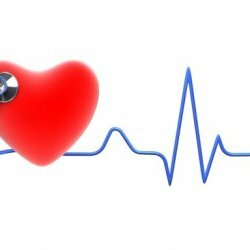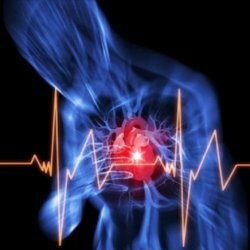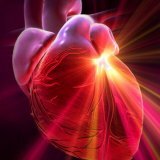Metabolic changes in the myocardium
 Under the metabolic alteration of the myocardium is understood a rather general term, which is used when describing electrocardiograms, or ECG.These changes are expressed in the deviation of segments of the electrocardiogram from the isoline, with respect to which the record is kept. This term generalizing and denotes the violation of metabolic processes in the heart muscle, that is, a violation in the cells of the myocardium - cardiomyocytes. These changes in the cells can lead to a violation of the contractility of the heart muscle.
Under the metabolic alteration of the myocardium is understood a rather general term, which is used when describing electrocardiograms, or ECG.These changes are expressed in the deviation of segments of the electrocardiogram from the isoline, with respect to which the record is kept. This term generalizing and denotes the violation of metabolic processes in the heart muscle, that is, a violation in the cells of the myocardium - cardiomyocytes. These changes in the cells can lead to a violation of the contractility of the heart muscle.
Metabolic changes in the myocardium does not always mean
disease is not uncommon metabolic changes may come to light on the cardiogram with the general well-being of the patient. In these cases, special attention should not be paid to these changes, since the heart is a rather gentle organ that reacts to a large number of external stimuli associated with increased stress. Load, for example, can be a celebration, which consume large amounts of alcohol, and there was dancing till the morning, or physical work without preparing or severe stress. In such cases, it is sufficient to return to the correct mode of sleep and rest, healthy nutrition without alcohol, and all the identified changes will go away in the near future.
Diagnose at the first sign
 pain, however, a patient whose electrocardiogram revealed metabolic changes in the heart muscle, often complains, for instance, of shortness of breath on exertion, chest pain in the heart, disruptions in the heart, impairedRhythm and other uncomfortable sensations on the part of the circulatory system. In such cases, one should take his health seriously. It is better to seek the advice of a specialist: a therapist or cardiologist who will prescribe the examination, identify the cause of the changes and prescribe adequate treatment. If you do not do it on time, then there may be deplorable consequences.
pain, however, a patient whose electrocardiogram revealed metabolic changes in the heart muscle, often complains, for instance, of shortness of breath on exertion, chest pain in the heart, disruptions in the heart, impairedRhythm and other uncomfortable sensations on the part of the circulatory system. In such cases, one should take his health seriously. It is better to seek the advice of a specialist: a therapist or cardiologist who will prescribe the examination, identify the cause of the changes and prescribe adequate treatment. If you do not do it on time, then there may be deplorable consequences.
Possible diseases with changes in the myocardium
There is a large number of diseases of the cardiovascular system, accompanied by changes in the heart muscle. Firstly, it is angina that develops mainly because of the discrepancy between myocardial blood flow and stress. Usually this happens because of the deposition of atherosclerotic plaques on the walls of the coronary arteries. The deposits gradually cover the vessel and thereby disrupt the blood flow. As a result, nutrients can not be fully delivered to the heart muscle and metabolic disorders occur. If you do not take stenocardia seriously, an acute myocardial infarction can occur and the patient will be bedridden for at least a month.
Report metabolic processes may also speak of hypertension, various types of arrhythmias, hypertension, myocardial dystrophy, vasculitis( inflammation of the vessel walls), cardiomyopathies, malformations of the heart, rheumatic heart disease, and others.
Changes in metabolism may result from variousDiseases of various organs and systems, including:
- obesity;
- hypo- and avitominose;
- alcoholism( excessive consumption of alcoholic beverages);
- incessant physical stress( usually occurs in professional athletes);
- acute pancreatitis;
- protein metabolism disorders;
- anemia;
- influence of physical factors( overheating, radiation, hypo-priming, vibration, hypothermia);
- infectious diseases( sore throats, transferred in recent time to ARVI, chronic tonsillitis, caries and other foci of infection);
- endocrine diseases, as a rule, hypo- and hyperfunction of the thyroid gland, disruption of the pituitary gland;
- impaired kidney and liver function;
- influence of factors of a chemical nature( industrial and domestic poisons, medicines).
Do not forget that the signs of change in the metabolism of the heart muscle on the electrocardiogram in conjunction with complaints requires immediate referral to a specialist. You can not make a diagnosis yourself and especially treat yourself. Only a qualified specialist can comprehensively evaluate all the symptoms, prescribe examinations, diagnose and prescribe appropriate treatment.



